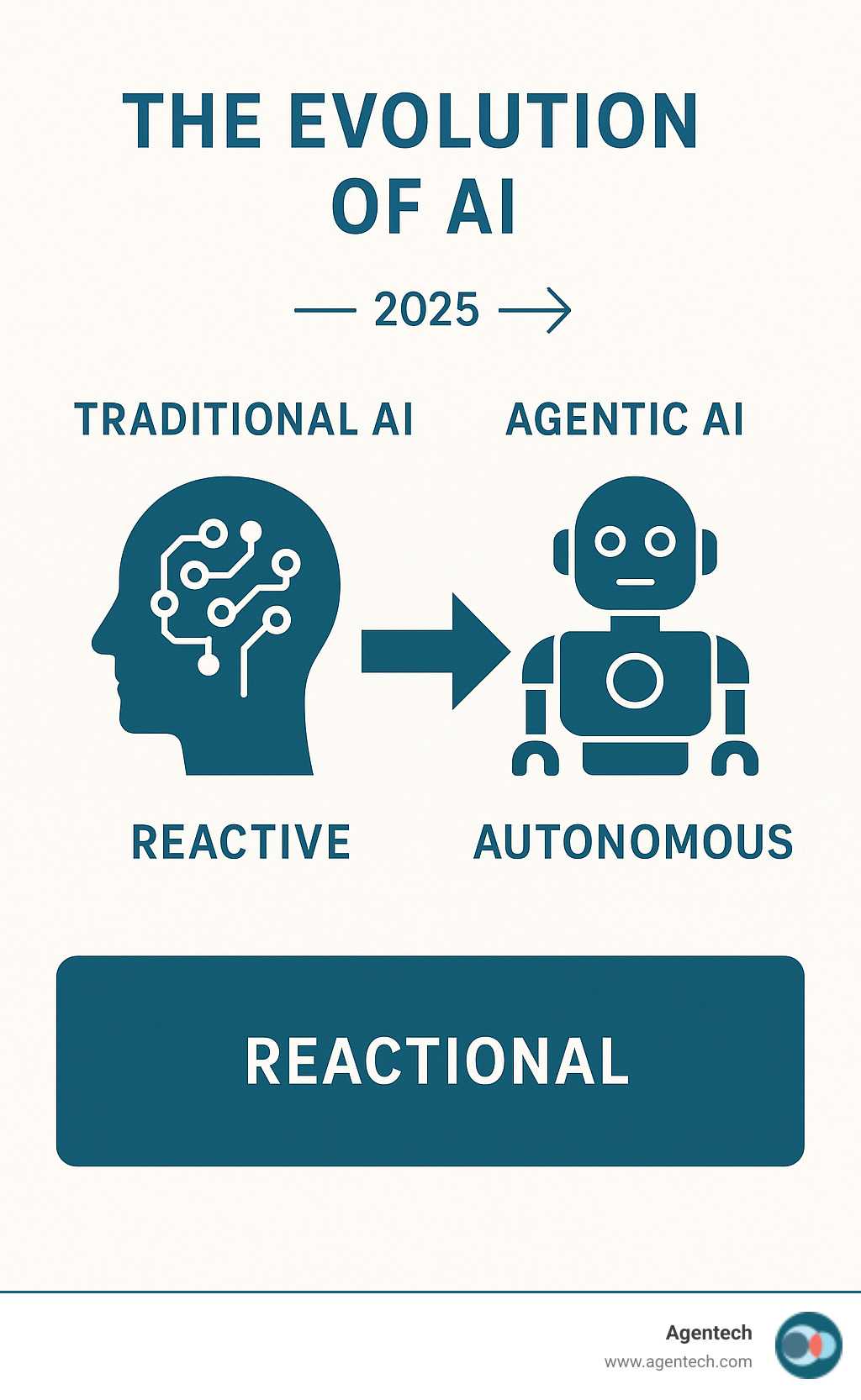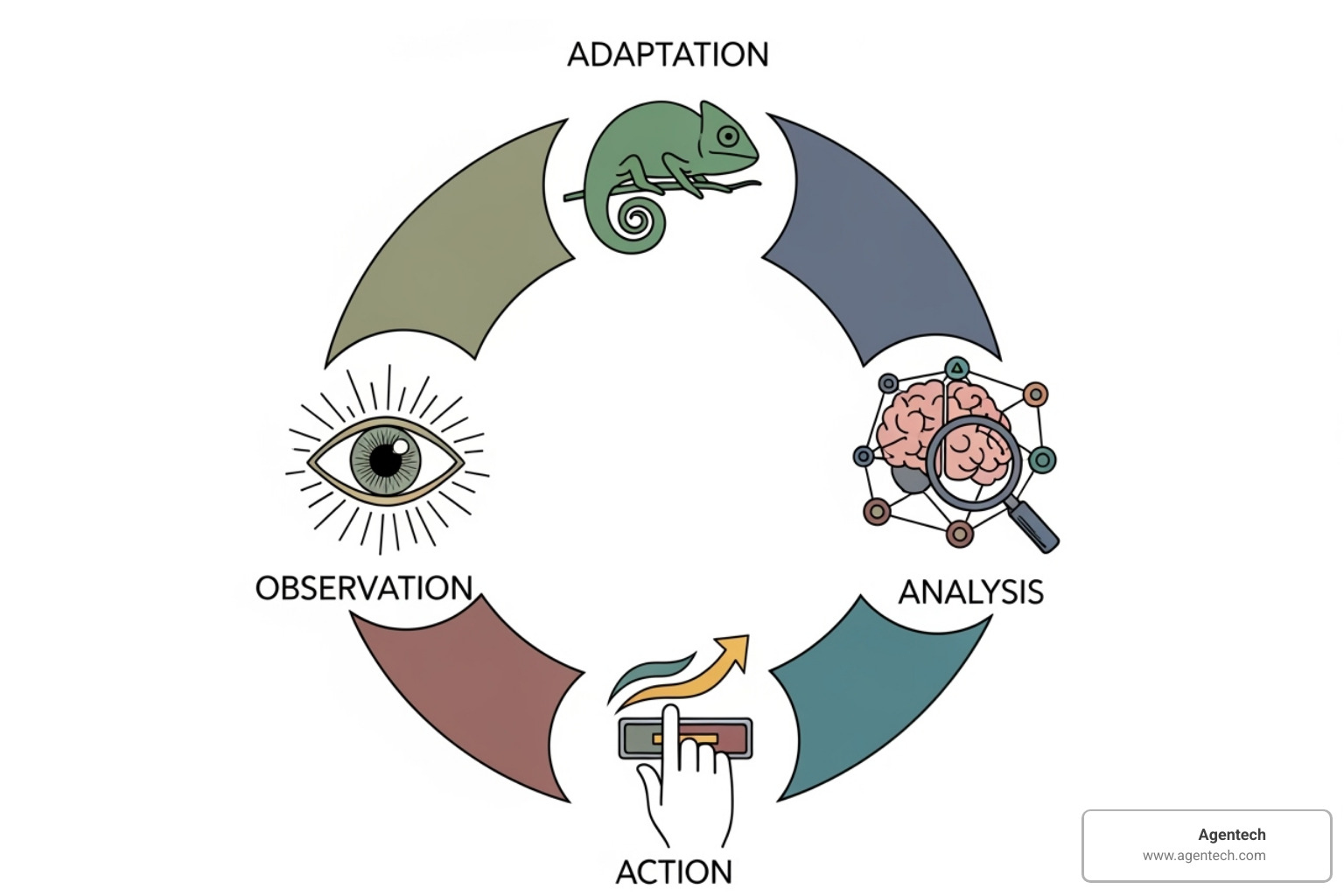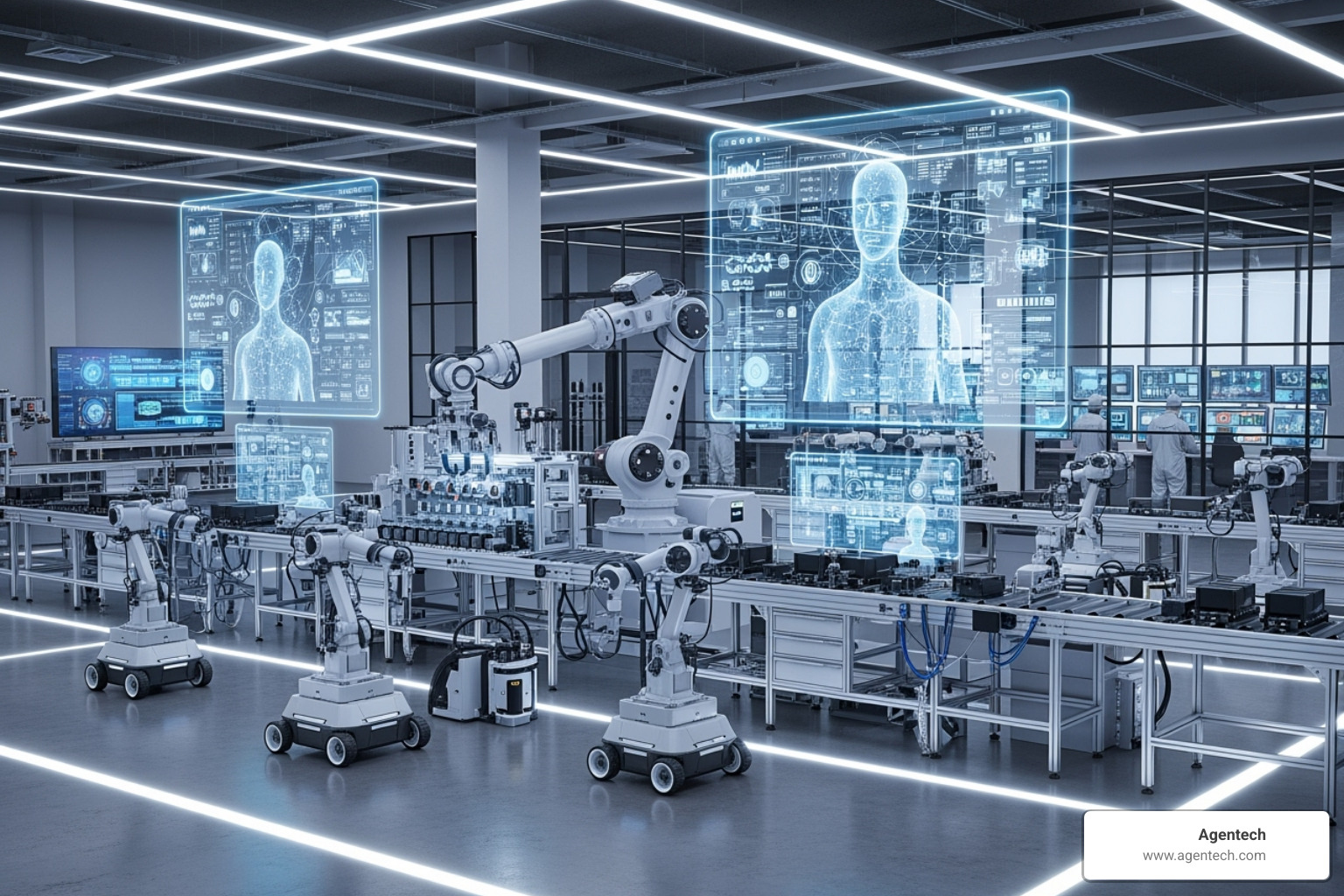Why Agentic AI Matters Now
The agentic ai definition refers to a class of artificial intelligence systems that can act independently to achieve specific goals with limited human supervision.
Here's what that means:
- Autonomous: They make their own decisions and initiate actions.
- Goal-Oriented: They work towards predefined objectives.
- Adaptive: They learn from their environment and adjust behavior.
- Task-Executing: They perform complex, multi-step tasks.
Artificial intelligence is always changing. It's moving from simple tools to systems that can think and act for themselves. This shift brings big changes for businesses, especially for busy managers like you.
Imagine AI that doesn't just answer questions or follow rules. Imagine AI that takes initiative. This is the power of agentic AI. It's about AI becoming a proactive partner, not just a reactive tool.
This new AI can automate complex tasks. It can free up your team for more important work. This is why understanding agentic AI is key for the future of work.
I'm Alex Pezold, and at Agentech AI, we're building the AI workforce for insurance. My experience scaling technology businesses like TokenEx and advising through Pointe Capital has shown me the power of precise agentic ai definition in changing industries, starting with insurance claims processing.

What is Agentic AI and How Does It Differ?
Think of the best coworker you've ever had. They didn't just wait for detailed instructions. They understood what needed to be done, figured out the best approach, and got it done—even when things didn't go according to plan. That's essentially what agentic AI brings to the table.
Traditional AI is like that reliable assistant who follows your exact instructions perfectly every time. Generative AI is the creative colleague who can whip up amazing content when you give them a prompt. But agentic AI? That's your proactive team member who takes ownership of complex goals and figures out how to achieve them, even when the situation changes.
Here's how these different types of AI stack up:
| Feature | Traditional AI | Generative AI | Agentic AI |
|---|---|---|---|
| Autonomy | Low (follows strict rules) | Moderate (creates based on prompts) | High (makes decisions, acts independently) |
| Primary Goal | Execute predefined tasks, classify data | Create new content (text, images, code) | Achieve complex goals, solve multi-step problems |
| Interaction | Reactive (responds to specific inputs) | Reactive (responds to user prompts) | Proactive (initiates actions, adapts to environment) |
| Supervision | Constant human oversight, fixed rules | Human guidance for content generation | Limited supervision, learns and self-corrects |
| Decision-making | Rule-based, deterministic | Pattern-based, probabilistic content generation | Goal-driven, adaptive, iterative planning |
The magic happens when AI systems can actually do things, not just respond to things. They become partners in getting work done, rather than tools waiting for the next command.
What is the formal agentic ai definition?
The agentic ai definition might sound academic, but it's actually pretty straightforward. These are AI systems that can sense what's happening around them, make smart decisions, and take action over time to reach specific goals—all without someone holding their hand every step of the way.
This isn't a brand-new concept. Smart researchers like Alan Turing and Norbert Wiener were thinking about intelligent, self-managing systems decades ago. In fact, a foundational paper on software agents from 1996 laid out what makes an AI system truly "agentic."
What sets these systems apart comes down to five key traits:
Autonomy means they can operate without someone constantly telling them what to do next. They make independent choices based on the situation at hand. Goal-driven behavior keeps them focused on achieving specific objectives, like a good employee who never loses sight of the bigger picture.
Decision-making capabilities let them weigh options, think through problems, and choose the best path forward. Environmental interaction allows them to perceive what's happening in their digital (or physical) world and respond accordingly.
Perhaps most importantly, continuous learning means they get better over time. They look at what worked, what didn't, and adjust their approach. It's like having a team member who actually learns from their mistakes and gets more effective with experience.
Think of it this way: an AI agent is software that acts on your behalf with real independence. It has goals, makes purposeful decisions, and stays in control of its own actions to get things done.
How does the agentic ai definition differ from generative AI?
Here's where things get interesting—and where a lot of people get confused. Both generative AI and agentic AI use powerful technologies like Large Language Models, but they're built for completely different purposes.
The biggest difference is action versus creation.
Generative AI is all about making new stuff. You ask it to write a blog post, create an image, or generate code, and it produces something based on what it learned during training. It's incredibly good at this, but it's fundamentally reactive. You prompt, it creates, then it waits for your next request.
Agentic AI is focused on getting things done. It might use generative AI to understand what you're asking or to craft a response, but its real job is to independently tackle complex, multi-step tasks from start to finish. It doesn't just generate content about booking a business trip—it actually books the flights, reserves the hotel, adjusts for delays, and handles the unexpected hiccups along the way.
The difference between proactive and reactive is huge here. Generative AI waits for you to ask. Agentic AI sees what needs to happen and takes initiative. One excels at multi-step problem solving, breaking down complicated goals into manageable pieces and working through them systematically.
Here's the key insight: Large Language Models are crucial for agentic AI—they provide the "thinking" power for reasoning and understanding. But in an agentic system, the LLM is just one component. The system wraps that language model with the ability to perceive situations, make plans, take actions, and learn from the results.
It's the difference between having a brilliant writer on your team and having someone who can write and execute a complete project plan. Both are valuable, but agentic AI is designed to be your autonomous colleague who can handle the whole job.
How Agentic AI Works: The Perceive, Reason, Act, Learn Cycle
Think of agentic ai definition as a smart colleague who never stops improving. Unlike traditional software that follows the same steps every time, agentic AI operates in a continuous cycle that makes it remarkably adaptable and autonomous.
This isn't a one-and-done process. It's an ongoing loop of watching, thinking, doing, and learning. We call this the "Perceive, Reason, Act, Learn" cycle, and it's what gives these systems their impressive ability to handle complex tasks without constant supervision.

Perceive is where it all starts. The AI gathers information from its environment, much like you might scan a room when you walk in. For a digital system, this means processing real-time data, reading documents, or pulling information from databases. In insurance, an agentic AI might perceive a new claim by reading the submission, checking policy details, and reviewing any attached photos or documents.
Reason is the thinking stage. Here's where the magic happens. The AI uses Large Language Models (LLMs), Natural Language Processing (NLP), and Machine Learning to understand what it's seeing and figure out the best approach. It's like having a really smart person analyze the situation, consider different options, and make a plan. The system breaks down complex problems into manageable pieces and weighs different solutions.
Act is where plans become reality. The AI doesn't just think about what to do—it actually does it. This might mean calling APIs, updating databases, sending emails, or triggering other systems. Our insurance example might see the AI requesting additional documentation, scheduling an inspection, or even processing a straightforward claim payment.
Learn is what makes agentic AI truly powerful. After each action, the system looks at what happened. Did it work well? Could it have done better? Through Reinforcement Learning, the AI gets smarter with every interaction. It remembers what worked and adjusts its approach for next time.
This cycle repeats continuously, allowing the AI to handle situations that would stump traditional rule-based systems. When something unexpected happens, it adapts.
Core Components of an Agentic System
Behind this smooth cycle are four essential building blocks that make everything work together seamlessly.
The prompt is like giving someone their job description. It tells the agent what it needs to accomplish and sets the boundaries for how it should behave. A well-crafted prompt keeps the agent focused and effective.
Memory is crucial for any intelligent system. The agent needs to remember past conversations, previous decisions, and learned patterns. This includes both short-term memory for handling immediate tasks and long-term memory for storing knowledge that improves performance over time.
Tools are what give agentic AI its real-world power. These are the external functions and APIs that let the agent actually do things—access databases, send communications, update records, or integrate with other business systems. The agent's ability to pick the right tool for each situation is what makes it so versatile.
Planning transforms big goals into actionable steps. When faced with a complex task, the agent breaks it down, prioritizes the steps, and adapts when things don't go as expected. It's like having a project manager built right into the system.
These components work together like a well-coordinated team, giving the agent both the intelligence to think and the capability to act.
The Role of Data and Learning
Data is the fuel that powers agentic AI, and the quality of that data directly affects how well the system performs. The more diverse and relevant the information, the smarter the agent becomes.
This creates what we call a data flywheel. Every interaction generates new information that feeds back into the system, making it more effective. It's a virtuous cycle of continuous improvement where today's actions make tomorrow's decisions better.
For enterprise applications, agentic AI needs access to both real-time data and your organization's proprietary information. This is where Retrieval-Augmented Generation (RAG) becomes essential. RAG lets the AI tap into your specific knowledge bases, ensuring it has access to the most current and relevant information for your business context.
In insurance, this might mean accessing the latest policy terms, regulatory updates, or claims precedents. The AI stays current with your business needs without requiring constant manual updates.
At Agentech, we believe the best AI doesn't feel like AI. It's invisible. When agentic AI is working properly, it integrates so smoothly into your existing workflows that it feels like a natural extension of your team's capabilities. The technology fades into the background, and what remains is simply better, faster, more accurate work.
Real-World Impact: Agentic AI Applications and Benefits
The buzz around agentic AI isn't just about cool new tech; it's about real, tangible benefits that are already changing how businesses operate. We're talking about a future that's happening now, where smart systems work alongside us, making things smoother, faster, and more efficient. By letting these intelligent systems act on their own, we're open uping incredible levels of productivity and fresh ways of thinking.

What kind of benefits are we seeing? Well, for starters, there's increased efficiency. Agentic AI can tackle those big, multi-step tasks that used to take so much human time. Think about it: processes that once needed constant human checking can now run almost on their own, speeding things up dramatically. For example, some companies, like Siemens, have seen a 25% drop in unplanned downtime just by using agentic AI to keep their operations running smoothly.
Then there's human augmentation. This isn't about replacing people; it's about making our work lives better. Agentic AI takes care of the repetitive, data-heavy stuff, freeing us up to do the really interesting work – the creative problem-solving, the strategic thinking, and the things that truly need a human touch. Experts even predict that by 2030, AI could automate a big chunk of our work hours (up to 30%!), letting us focus on bigger, more impactful challenges and sparking new ideas.
And let's not forget cost reduction. When you streamline workflows and make processes smarter, you naturally save money. Imagine AI Phone Agents handling millions of customer calls at a fraction of what human agents would cost. Plus, agentic AI systems can work 24/7, never needing a break or a holiday. This means constant availability and quick responses, which is a huge win, especially for customer-facing roles. In fact, over half of service pros say they've seen big improvements in customer interactions, with faster response times and happier customers.
Use Cases Across Industries
The cool thing about agentic AI is how flexible it is. You can find it making a difference in almost every industry you can think of.
Take Customer Service Automation, for instance. Beyond just basic chatbots, agentic AI can handle really complex customer questions, dig through internal systems, process refunds, or even suggest products based on what you've been looking at. They're smart enough to answer all sorts of questions based on context, not just a limited list of pre-set answers.
In Software Development, AI coding agents are becoming digital teammates. They can write and review huge chunks of code, run tests automatically, and even figure out what a piece of code is supposed to do from scratch. This seriously boosts how much developers can get done.
For Industrial Automation and Predictive Maintenance, agentic AI is a game-changer. In factories, it looks at real-time data from machines, figuring out when something might break before it actually does. This allows for proactive maintenance, cutting down on unexpected stops. Remember Siemens? That 25% reduction in downtime we mentioned earlier? That's thanks to this kind of smart prediction.
Even in the world of Financial Trading, autonomous algorithms are making waves. Think of systems like JPMorgan & Chase's 'LOXM,' which can make trades and adjust investments in real-time as markets shift, often reacting much faster than any human ever could.
In Healthcare, agentic AI helps doctors by sifting through tons of patient data, assists with diagnoses, keeps an eye on patients' conditions, and can even provide round-the-clock support for things like remembering to take medication or scheduling appointments.
And for Supply Chain Management, it's all about keeping things flowing smoothly. From tracking what's in stock and rerouting shipments because of traffic or weather, to automatically placing orders and making logistics super efficient, agentic AI helps create supply chains that are both effective and tough.
But this is where we at Agentech truly shine: Insurance Claims Processing. Our AI tools are built to make handling claims much simpler. They take on all those repetitive, administrative tasks – like collecting initial information, checking documents, and sending out routine messages. This means our human adjusters can focus on the really tough stuff, like complex assessments and offering empathetic support to customers. We truly believe in embracing AI agents as digital coworkers to improve the future of work in insurance.
Key Challenges and Ethical Considerations
While the potential of agentic AI is huge, we also need to be thoughtful and careful as we develop and use it. There are some important challenges and ethical questions we need to tackle head-on.
One big hurdle is system complexity. Designing, testing, and fixing these smart, independent systems can be incredibly tricky. Because they learn and adapt, it's hard to predict every single thing they might do.
Then there are security risks. As agentic systems get more access and independence, they become tempting targets for bad actors. We need to worry about things like data being stolen by web-browsing agents or security holes from unusual ways they communicate.
Data privacy is another huge concern. Agentic AI often deals with a lot of sensitive information. We absolutely must make sure that private data is protected and that we follow all the rules and regulations.
And what about algorithmic bias? If the data used to train these AIs has hidden biases, the agentic AI can pick up on them and act in unfair or discriminatory ways. This means we need to be really careful about the data we use and constantly check for problems.
Accountability is a thorny issue too. If an autonomous AI system makes a mistake or causes harm, who is responsible? Figuring out who's on the hook for the actions of agentic AI is a pressing legal and ethical challenge we're all working through.
Finally, there's the concern about job displacement. While agentic AI can make us more capable, its ability to automate tasks does make some people worry about jobs in certain areas. The best path forward is to focus on helping people learn new skills and promoting teamwork between humans and AI.
Tackling these challenges requires everyone to pitch in – governments, tech experts, and ethicists. We need to build in safeguards to make sure AI agents do the right thing and align with our human values. If you're interested in diving deeper, OpenAI's paper on "Practices for Governing Agentic AI Systems" offers some great insights into navigating these complex waters.
Frequently Asked Questions about the Agentic AI Definition
It's natural to have questions about new and exciting technologies like agentic AI! Let's clear up some common points of confusion with clear, simple answers.
What is the relationship between agentic AI and AI agents?
This is a really common question, and it's quite straightforward once you get the hang of it. Think of it like this:
- Agentic AI is the big idea or the philosophy. It's the blueprint for a special kind of artificial intelligence that can act on its own, learn, and work towards goals. It’s the agentic ai definition itself—the whole concept of intelligent, autonomous systems.
- AI agents are the actual software programs that bring that idea to life. They are the individual "workers" or "doers" that operate within the rules of Agentic AI.
So, Agentic AI is the framework, and AI agents are the specific tools or programs you use that fit within that framework. You can't have an AI agent without the underlying concept of Agentic AI guiding its design and function.
What are the main benefits of using agentic AI?
The benefits of bringing agentic AI into your operations are truly game-changing! They go far beyond just saving time and money. Here are some of the biggest upsides:
- Automating complex, multi-step tasks: Forget simple, repetitive automation. Agentic AI can tackle entire projects that involve many different steps and decisions. It's like having a super-capable project manager that can break down big goals and see them through. In fact, the ability of these models to successfully complete complex tasks has been doubling every 7 months since 2019!
- Increasing operational efficiency: When tasks that used to take hours or even days are handled by an AI agent, everything speeds up. This means smoother workflows, fewer bottlenecks, and a significant boost in how much your team can achieve.
- Enabling systems to adapt to new information without human reprogramming: This is huge! Agentic AI learns as it goes. If something changes, it doesn't need you to rewrite its instructions. It figures out the best way forward on its own, just like a seasoned expert who adapts to new challenges.
- Freeing up human workers for more strategic, high-value work: This might be the most exciting benefit for your team. Imagine your employees no longer buried under mountains of tedious, repetitive tasks. Instead, they can focus on creative problem-solving, building stronger relationships with clients, innovating new ideas, and tackling the truly strategic work that only humans can do. It's about empowering your people, not replacing them.
Is agentic AI the same as automation?
Not quite! While agentic AI definitely performs automation, it's a much more advanced form than what most people think of when they hear "automation."
Think of it like this:
- Traditional automation (like Robotic Process Automation or RPA) is like a very well-trained robot that follows a precise, pre-set script. It's fantastic for tasks that are always the same, with no surprises. If something unexpected happens, it usually stops and waits for a human to step in. It lacks the ability to think for itself or learn.
- Agentic AI, on the other hand, is dynamic and has a mind of its own (in the best way!). It doesn't just follow a script; it perceives, reasons, plans, acts, and learns. It has "agency"—the power to make its own decisions and adapt its approach to achieve a goal, even if the path changes. It's designed to handle unforeseen circumstances and continuously improve.
So, while all agentic AI involves automation, not all automation is agentic AI. Agentic AI takes automation to a whole new level by adding intelligence, independence, and adaptability. It's about giving your systems the ability to truly do rather than just follow.
Conclusion: Embracing an Autonomous Future
Wow, we've covered a lot of ground today! We've journeyed through the amazing world of agentic AI, from understanding its formal agentic ai definition to seeing how it actually works and changes industries. What's super clear is that AI is no longer just a simple tool. It's becoming a proactive, independent partner.
This shift means machines aren't just processing info or creating content anymore. They're genuinely "thinking" and "doing" things on their own. They set goals and adapt to get them done. For businesses like yours, this opens up huge doors. You can boost efficiency, help your team achieve more, and find exciting new ways to innovate. The future of work isn't humans versus machines. It's humans and AI working together, hand-in-hand. AI agents handle the complex, repetitive tasks. This frees up your team to be creative and tackle bigger, more rewarding challenges.
At Agentech, we're right at the front of this exciting change. Especially in the insurance world! Our AI agents fit right into your existing flow. They make claims processing smoother and faster. They boost your adjusters' productivity. But here's the key: they do this without replacing human decision-making. We're not just automating; we're empowering. We make sure your human teams can focus on what they do best: giving great service and making smart, complex decisions.
Embracing this autonomous future with agentic AI is truly exciting. We're dedicated to building AI solutions that are responsible, effective, and truly make a positive difference. We invite you to see how our AI agents can transform your operations and help you welcome this powerful new era.




